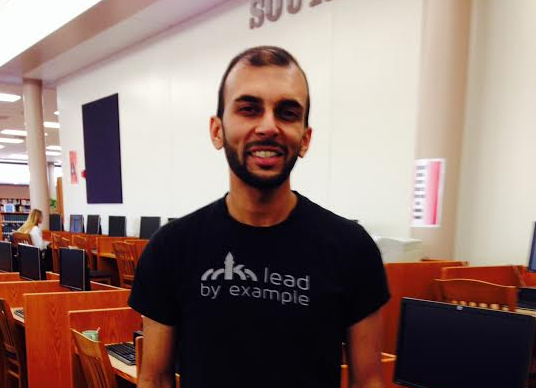Humanitarian shares his compassion with students

Rashid spoke to various social studies classes in the library on Sept. 16 in honor of Constitution Day.
The attentiveness in the eyes of the students was undeniable. In front of them stood Qasim Rashid, accomplished author, humanitarian, and motivational speaker. While his story may be different from those of us who have grown up near Hinsdale, his message is universal.
“Embrace someone different,” Rashid said. “You may know that person walking down the hall, but you can never truly know him until you have embraced him. It is not enough just to tolerate someone different.”
Rashid moved from Pakistan to the United States in 1987 when he was only five-years-old. He was one of the fortunate ones. Pakistan has had a long history of violence carried against people with different religious views.
“It has gotten worse since I left Pakistan,” Rashid said. “ There are anti-blasphemy laws in place now. Many of the people in charge of Pakistan grew up learning from Islamic extremists. Those who speak out against terrorist attacks are often assassinated. There are small pockets of hope in Pakistan, people with the compassion for others. It will still be a long time before there might be peace.”
The United States Commission on International Religious Freedom has now labeled Pakistan a CPC or Country of Particular Concern. The situation there has remained in turmoil ever since the middle 1900s. With recent events involving the IS in Iraq and Syria, the Social Studies Department thought it fitting to bring Rashid in to discuss his own experiences.
When asked about his views on the situation in Iraq and the terrorist organization known as ISIS, Rashid offered his insight.
“Looking back on the history of Iraq, the growth of ISIS is a combination of different factors,” Rashid said. “Extremist thinkers and ideals have existed since the 1920s and 1930s. It is important for people in the US to understand why ISIS was able to gain power. The people of Iraq have been through war in the last three decades. The breakdown of civilian trust has really allowed these ideas and extremists to take power. Their violence shows their lack of compassion. More violence from outside countries will not solve the disease of intolerance.”
Rashid also explained his observations on the subject of humanitarian efforts.
“When a disaster strikes a country, like if an earthquake hits, you will see countries come together,” Rashid said. “People of all religions, races, and nations come together to help each other. There are plenty of opportunities, even in our neighborhoods in America. We should all start at home so that we can create a better environment to live in.”
Students who attended the event walked away with a better insight into what is happening in the Middle East and how some people are using humanitarian efforts to help.
Rashid is also the author of The Wrong Kind of Muslim. He hopes that one day Pakistan will find peace and that people will learn to embrace each other despite differences in beliefs and ethnicity.











